
REVISTA COLOMBIANA DE ENTOMOLOGIA
Scope & Guideline
Connecting Biodiversity and Agriculture through Insect Studies
Introduction
Aims and Scopes
- Insect Ecology and Behavior:
Research exploring the ecological roles of insects, their behaviors, interactions within ecosystems, and responses to environmental changes. - Insect Taxonomy and Systematics:
Studies focusing on the classification, identification, and evolutionary relationships of insect species, contributing to the understanding of biodiversity. - Insect Management and Control:
Investigations into pest management strategies, including the use of biological control agents, plant extracts, and chemical treatments for agricultural pests. - Insects as Vectors of Disease:
Research addressing the role of insects in the transmission of pathogens affecting human health and agriculture, including studies on vector biology and control. - Insect Diversity and Conservation:
Explorations of the diversity of insect populations in various habitats, emphasizing conservation efforts and the importance of maintaining biodiversity. - Applied Entomology:
Practical applications of entomological research in agriculture, forestry, and public health, focusing on improving pest management and environmental sustainability.
Trending and Emerging
- Climate Change Impact on Insect Populations:
An increasing number of studies are examining how climate variables affect insect distribution, behavior, and population dynamics, reflecting growing concerns about climate change. - Sustainable Agricultural Practices:
Research focusing on sustainable pest management strategies, including the exploration of biopesticides and the role of beneficial insects in agriculture, is gaining traction. - Insect-Microbe Interactions:
There is a rising interest in the interactions between insects and their microbial symbionts, which can influence health, behavior, and ecological roles. - Urban Entomology:
With urbanization on the rise, research addressing insect issues in urban environments, including pest control and biodiversity, is becoming more prominent. - Insect Responses to Environmental Stressors:
Studies investigating how insects respond to various environmental stressors, including pollutants and habitat changes, are emerging as critical areas of interest.
Declining or Waning
- Chemical Insecticides and Resistance Studies:
There appears to be a reduced focus on traditional chemical insecticides and resistance studies, as researchers shift towards integrated pest management and environmentally friendly alternatives. - General Insect Physiology:
Research focusing solely on insect physiology is less frequently published, possibly due to a greater emphasis on ecological and applied aspects of entomology. - Non-Agricultural Entomology:
There is a waning interest in studies related to insects outside of agricultural contexts, suggesting a stronger focus on economically relevant species and their management. - Basic Taxonomic Studies:
While taxonomy remains important, there seems to be a decline in purely descriptive taxonomic studies, likely in favor of integrative approaches that combine molecular techniques.
Similar Journals

Austral Entomology
Fostering Collaboration in Insect ResearchAustral Entomology, published by Wiley, is a leading journal in the field of entomology, specializing in the study of insects within the wider context of agronomy, ecology, and evolutionary biology. With an impact factor that reflects its growing influence and a commendable H-Index, this journal serves a vital role in disseminating cutting-edge research that bridges the gap between basic entomological studies and applied agricultural practices. Since its inception in 2014, Austral Entomology has maintained a strong commitment to open access, fostering a collaborative environment for researchers and practitioners. Recognized within category quartiles Q2 across multiple fields such as Agronomy and Crop Science and Ecology, it ranks impressively among journals in Insect Science, showcasing the significance of its contributions to understanding insect behavior, ecology, and systematics. Given its robust accessibility options, the journal not only enhances the visibility of entomological research but also empowers professionals and students alike to engage with and apply findings in real-world contexts.
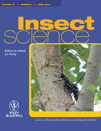
Insect Science
Leading the way in insect-related research and discovery.Insect Science, published by WILEY, stands as a prestigious journal in the realms of Agronomy, Biochemistry, Genetics, and Insect Ecology. The journal, with ISSN 1672-9609 and E-ISSN 1744-7917, has firmly established itself as a significant resource for researchers and professionals seeking to explore the intricate dynamics of insects and their crucial roles in ecosystems. With a remarkable impact factor placing it in the Q1 quartile across multiple categories, including Ecology and Evolution and Agronomy and Crop Science, Insect Science ranks impressively at #8 out of 181 in the realm of Insect Science on Scopus, showcasing its influence and relevance in the field. Spanning its coverage from 1994 to 2024, this journal invites contributions that advance our understanding of insect biology, behavior, and their interactions within agricultural contexts. The commitment to high-quality research and its role in fostering interdisciplinary dialogue make Insect Science an essential platform for scholars and practitioners at the forefront of insect-related studies.

EUROPEAN JOURNAL OF ENTOMOLOGY
Pioneering insights into insect biology and ecology.The European Journal of Entomology, published by the Czech Academy of Sciences, Institute of Entomology, is a pivotal journal in the field of Insect Science. With a solid impact factor and recognized ranking—placed in the Q2 quartile in 2023, and ranked #72 out of 181—this journal offers a platform for researchers and professionals alike to share insightful studies and advancements in entomological research. Since its inception in 1993, the journal has continuously evolved to cover a wide spectrum of entomological disciplines, establishing itself as an essential resource for academia and industry. Although it operates on a subscription basis, the journal ensures accessibility for a broad audience of scholars, students, and enthusiasts eager to stay at the forefront of entomological science. Located in Ceske Budejovice, Czech Republic, this journal not only highlights European contributions but also embraces global perspectives, making it an indispensable reference point in the ongoing exploration of insect biology and ecology.

CANADIAN ENTOMOLOGIST
Cultivating a Deeper Understanding of Insect InteractionsCanadian Entomologist, published by Cambridge University Press, is a prominent journal dedicated to the field of entomology, covering key areas such as insect science, ecology, and evolutionary biology. With its origins dating back to 1868, this esteemed journal has continuously contributed to the understanding of insect behavior, systematics, and physiology, engaging researchers and professionals alike. Although currently not an Open Access journal, it offers valuable insights through its rigorously peer-reviewed articles, reflecting its commitment to scientific excellence. The journal has garnered a respectable Q3 ranking in various categories, including Ecology, Evolution, Behavior, and Systematics, making it a critical resource for scholars and students who seek to explore the complex interactions within insect populations and their environments. Researchers can trust Canadian Entomologist to provide relevant and impactful research that shapes contemporary understanding in the realm of entomological studies, fostering the growth of this vital scientific discipline.
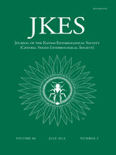
JOURNAL OF THE KANSAS ENTOMOLOGICAL SOCIETY
Cultivating Understanding of Entomological DiversityJOURNAL OF THE KANSAS ENTOMOLOGICAL SOCIETY, published by the Kansas Entomological Society, serves as a vital platform dedicated to the field of entomology and insect science. With an ISSN of 0022-8567 and an E-ISSN of 1937-2353, this journal has established itself since its inception in 1994, continuing to contribute valuable research up to 2024. Despite its current Q4 categorization in the 2023 Insect Science rankings, it ranks 106 out of 181 in Scopus, representing a significant opportunity for researchers to disseminate their findings in a supportive and engaged community. Although it is not an open-access journal, its commitment to rigorous peer review and relevance in agricultural and biological sciences makes it an essential resource for professionals, scholars, and students alike. The journal's focus on local and regional entomological issues often addresses broader ecological impacts, showcasing the importance of insects in environmental health and agriculture. We invite you to explore the rich tapestry of findings and discussions within this esteemed publication.
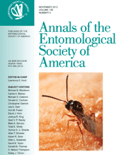
ANNALS OF THE ENTOMOLOGICAL SOCIETY OF AMERICA
Exploring the Intricacies of Insect LifeANNALS OF THE ENTOMOLOGICAL SOCIETY OF AMERICA is a premier journal dedicated to advancing the field of insect science, published by Oxford University Press. With an impressive impact factor and classified in the Q1 quartile for its category, this journal ranks among the top publications in agricultural and biological sciences, specifically within insect science, positioned at #28 out of 181, indicating its significant influence and high-quality research contributions. The journal aims to disseminate original research, comprehensive reviews, and groundbreaking findings that enhance our understanding of entomology, spanning across ecological, evolutionary, and applied segments. With a consistent publication history since 1938, researchers, professionals, and students will benefit from the wealth of knowledge presented in its pages. Although the journal does not currently offer open access, it remains a vital resource for those seeking to stay at the forefront of entomological research and innovation.
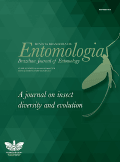
REVISTA BRASILEIRA DE ENTOMOLOGIA
Empowering the study of insects across Brazil and beyond.REVISTA BRASILEIRA DE ENTOMOLOGIA, published by the SOCIEDADE BRASILEIRA DE ENTOMOLOGIA, is a premier open-access journal dedicated to the field of insect science, particularly within the context of Brazil's rich biodiversity. Since its inception in 2002, this journal has aimed to provide a platform for the dissemination of high-quality research, covering various aspects of entomology including behavior, ecology, and the impact of insects on agriculture. With an ISSN of 0085-5626 and an E-ISSN of 1806-9665, it is indexed in Scopus, ranking in the 39th percentile among its peers in the insect science category. Operating out of Curitiba, Brazil, and with emerging recognition beyond national borders, the journal reflects an ongoing commitment to advancing the science of entomology through rigorous peer-reviewed articles. By making its content freely accessible, REVISTA BRASILEIRA DE ENTOMOLOGIA encourages widespread engagement and collaboration among researchers, professionals, and students alike.
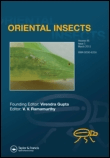
ORIENTAL INSECTS
Pioneering Insights into Insect Ecology and BehaviorORIENTAL INSECTS is a distinguished journal dedicated to advancing the field of Insect Science, published by the reputable Taylor & Francis Ltd. With its long-standing history since 1967, this journal provides a platform for innovative research focused specifically on the diverse insect fauna of the Oriental region, encompassing topics such as taxonomy, ecology, physiology, and behavior. The journal is indexed with an ISSN of 0030-5316 and an E-ISSN of 2157-8745, making it easily accessible to a global audience. Although it currently does not operate under an Open Access model, its rigorous peer-review process ensures the dissemination of high-quality research. As a Q4 journal in the Insect Science category for 2023 and ranked 103 out of 181 in Scopus, ORIENTAL INSECTS remains a vital resource for researchers, professionals, and students seeking to enhance their understanding of insect biodiversity and conservation. Located in the United Kingdom, it is committed to promoting the latest scientific findings and fostering collaboration among entomologists worldwide, contributing significantly to the academic community.

Insects is a prominent open-access journal published by MDPI, dedicated to advancing research in the vibrant field of insect science. Since its inception in 2011, this journal has become a vital resource for academics and professionals alike, also ranked in the prestigious Q1 category within the Insect Science field by Scopus, achieving a remarkable rank of 26 out of 181 journals. With an ongoing convergence period from 2010 to 2024, Insects provides comprehensive coverage of various aspects of entomology, including but not limited to ecology, behavior, physiology, and applied entomology. Based in Switzerland, the journal promotes an open-access model, ensuring that vital research is readily available to researchers, practitioners, and students globally. This journal not only facilitates the dissemination of groundbreaking entomological research but also fosters collaboration and interdisciplinary dialogue in the field.
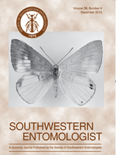
SOUTHWESTERN ENTOMOLOGIST
Exploring the Intersection of Insect Science and AgronomySOUTHWESTERN ENTOMOLOGIST is a pivotal academic journal dedicated to advancing the fields of Agronomy, Ecology, and Insect Science. Published by the SOUTHWESTERN ENTOMOLOGICAL SOC in the United States, this journal plays a crucial role in disseminating vital research findings that address pressing ecological and agricultural challenges. With its ISSN 0147-1724 and E-ISSN 2162-2647, the journal has been publishing comprehensive studies since 1993 and continues to contribute significantly to the knowledge base up to 2024. As a Q4 ranked journal in both Agronomy and Crop Science and Ecology, as well as Insect Science, it provides an inclusive platform for researchers and students to share their insights and foster collaborations. Although it currently does not offer open access options, the content is accessible to academic institutions and professionals, ensuring that significant findings reach a broad audience. Given its niche focus, SOUTHWESTERN ENTOMOLOGIST not only appeals to researchers and students but also to professionals looking to stay updated on the latest trends and developments in entomology and its related fields.